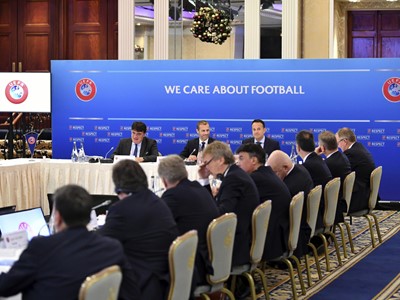Archives
UEFA Exco gives green light for new club competition
Published: 05-12-2018 12:45
More clubs from more associations will play European football from 2021, after the UEFA Executive Committee approved the creation of a third UEFA club competition for the 2021-2024 competition cycle at their meeting in Dublin.
• The new competition (which has the working title of UEL2) will mirror the existing UEFA Champions League and UEFA Europa League, and feature 32 teams in a group stage. • The format will see eight groups of four teams, followed by the round of 16, quarter-finals, semi-finals and final. • An additional knock-out round will be played before the round of 16 between teams ranked second in their groups and the third-ranked teams of the UEFA Europa League groups. • The new competition will feature 141 matches over 15 match weeks, exactly like the UEFA Europa League. • The winner of the new competition will be entitled to participate in the UEFA Europa League in the following season. • The new competition matches will be played on Thursdays. As such, the UEFA Champions League continues to be played on Tuesdays and Wednesdays, the UEFA Europa League and the new competition will be played on Thursday with one additional kick-off time slot for a limited number of matches in principle at 16.30 (CET) to be further defined. • All club competition finals will be played in the same week: Wednesday (new competition), Thursday (UEFA Europa League) and Saturday (UEFA Champions League). The new third competition will ensure that at least 34 countries will be represented in the group stages of the UEFA club competitions (today, the minimum guaranteed number is 26). All member associations will have access to the three club competitions and all associations will keep the same overall access quota as currently. UEFA President Aleksander Čeferin said: “The new UEFA club competition makes UEFA’s club competitions more inclusive than ever before. There will be more matches for more clubs, with more associations represented in the group stages. This competition was borne out of ongoing dialogue with clubs through the European Club Association. “There was a widespread demand by all clubs to increase their chances of participating more regularly in European competition. This has been achieved with a strategic approach, and in accordance with UEFA’s objective of having both more quality and more inclusivity in our club competitions.”